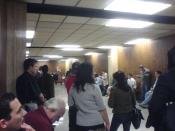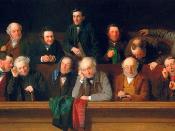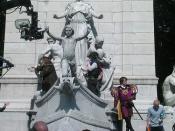Evidence
Introduction:
* What is major problem with holding trials? Answer - You are far away from the day of the actual event. The only people present at the event might not have been there the entire time. The issue is trying to reconstruct what previously happened from the people present at the event.
* What is the difference between what the jurors acquire and historian?
-Jurors receive only certain info gathered by both sides and given guidelines on what is allowed at trial. While, historian's look at anything.
-Historians gather both sides, but doing so voluntary. Only thing at stake is the reputation of the historian or the subject of the project. However, jurors must decide the fate of the persons involved.
-Jurors are asked to be impartial, but historian might start with a point of view. We hope that historians are experts or at least knowledgeable regarding the issue/event/subject, while the jurors are laymen and don't know much about the topics.
* Rough definition of evidence - What can the jury see in order to come to a correct decision.
* Guidelines to use in deciding what evidence a jury can view -
-Objective and Un-biased
-Rational v. Emotion/Passion
-Relevant
-Real facts and expert knowledge
Tanner v. United States
I: Whether we can question the jurors about their deliberations regarding their verdict.
Reasoning: Supreme Court decided that given the evidence rules, they were not allowed to question the jurors deliberation.
* Within the criminal justice system we have different values with not allowing jurors to discuss the jury process - Truth, protect the innocent; Fairness and justice. Free deliberation without being afraid of speaking your opinion. The court in this case focused more on finality of the case, efficiency of the trial and protecting the jurors.
* What...


